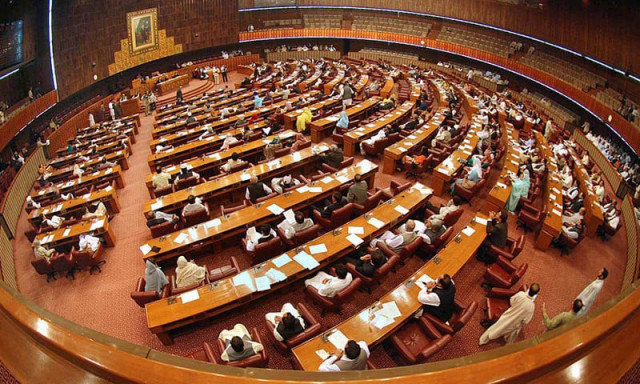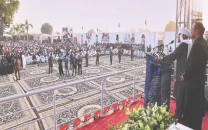PML-N-led alliance gains two-third majority in NA
Development comes after allotment of reserved seats that were denied to SIC

After the allotment of the reserved seats that were denied to the Sunni Ittehad Council (SIC), the PML-N has emerged as the largest party in the National Assembly, with the party and its allies securing a two-third majority in the lower house of parliament.
The SIC, a small party with an insignificant presence, became a refuge for the PTI-backed independent lawmakers, who joined it for the sake of the reserved seats.
However, its request for the allotment of the reserved seats was turned down by the Election Commission of Pakistan (ECP) because it had not submitted a “priority list” for them prior to the polls.
The PML-N-led coalition government in the Centre now has 229 members in the NA with the PPP, MQM-P, PML-Q, Istehkam-e-Pakistan Party (IPP), Pakistan Muslim League-Zia (PML-Z) and Balochistan Awami Party (BAP) as part of the alliance.
With a total of 334 seats in the NA, the PML-N has become the largest party in the House by bagging 123 of them after the allotment of the reserved seats.
The PPP now has 73 members in the NA after being allotted 16 and three reserved seats for women and minorities respectively in addition to the 54 general ones it had won.
The PPP Is followed by the MQM-P, which has 22 members in the NA, after being allotted four reserved seats for women and one for minorities. The PML-Q has five seats in the NA including one reserved for women allocated to it. The IPP has four MNAs after the allotment of one reserved seat for women. Both the PML-Z and BAP have one seat each in the lower house.
The SIC hold the second place in terms of NA seats with 82. The JUI-F has 11 MNAs after being allocated four reserved seats for women and one for minorities. Four parties each have one seat in the NA: Majlis Wahdat-e-Muslimeen (MWM), BNP-M, PkMAP, and ANP.
There are eight independent MNAs, who have not joined any party yet. Similarly, in the Punjab Assembly following the allotment of reserved seats, the PML-N has 224 MPAs in the provincial legislature out of a total of 336.
In the Punjab Assembly, PML-N won 139 general seats and 21 independent members later joined the party. The party was allotted 57 and seven reserved seats for women and minorities, respectively.
The SIC has 106 members in the provincial legislature.
Read also: Ruling alliance mulls discarding NAB
The PPP’s members in the Punjab Assembly have increased to 16 after one independent member joined it and it was allotted four reserved seats for women and one for minorities.
The number of PML-Q members in the Punjab Assembly has increased to 11 after it was allotted three reserved seats for women.
The IPP has six members in the Punjab Assembly as three independent MPAs joined it and the party was allotted two reserved seats for women.
The Tehreek-e-Labbaik Pakistan, PML-Z and MWM each have one seat in the provincial legislature.
The election was not held in one constituency of the Punjab Assembly and the notifications for four of them have been withheld by the ECP.
In the Sindh Assembly, the PPP now has 116 MPAs in the 168-member legislature after the allotment of the reserved seats.
Apart from its 88 members, 21 reserved seats for women and seven for minorities were allotted to it.
The MQM-P now has 37 members in the provincial legislature after being allotted seven reserved seats for women and two for minorities.
The Grand Democratic Alliance (GDA) has three members in the Sindh Assembly after it was allotted one reserved seat for women. The Jamaat-e-Islami has one seat in the provincial assembly. The Sindh Assembly has nine independent members. Notifications have not been issued for two seats of the Sindh Assembly as one victorious candidate passed away while the other has yet to submit the details of their election expenses to the ECP.
In the Khyber-Pakhtunkhwa Assembly, the SIC has 89 seats in the 145-member legislature. The number of the JUI-F MPAs has reached 18 after it was allotted 10 reserved seats for women and one for minorities.
The PML-N has 16 MPAs in K-P after it was allotted eight reserved seats for women and one for minorities.
Read: PML-N, PPP benefit from ‘SIC-claimed’ seats
The PPP has managed to take its tally in the provincial assembly to 11 following the allotment of six reserved seats for women and one for minorities.
The ANP, which was once the ruling party in K-P, has bagged two seats in the provincial assembly after it was allotted a reserved one for women.
Similarly, the PTI-Parliamentarians is also in a similar position in the K-P Assembly with two MPAs in the House after being allotted one reserved seat for women.
Elections were not held for two seats in the K-P Assembly while the ECP withheld the results of four provincial constituencies.
A minority seat quota will also be given after the completion of K-P Assembly results.
In the 65-member Balochistan Assembly, the PPP is leading with 17 MPAs after being allotted three reserved seats for women and one for minorities.
Following closely is the PML-N, which has 16 MPAs in the provincial assembly after it was allotted three reserved seats for women and one for minorities.
The number of JUI-F MPAs in the Balochistan Assembly has reached 12 after it was allotted two reserved seats for women and one for minorities.
The BAP has five MPAs in the provincial assembly after the allocation of one reserved seat for women.
The National Party has four members in the Balochistan Assembly following the allotment of one reserved seat for women. The ANP has three MPAs in the provincial assembly after the allocation of one reserved seat for women.
The JI, BNP-M and Haq Do Tehreek have one seat each in the Balochistan Assembly. The ECP has withheld the results of three provincial assembly seats.
(With input from APP)



















COMMENTS
Comments are moderated and generally will be posted if they are on-topic and not abusive.
For more information, please see our Comments FAQ